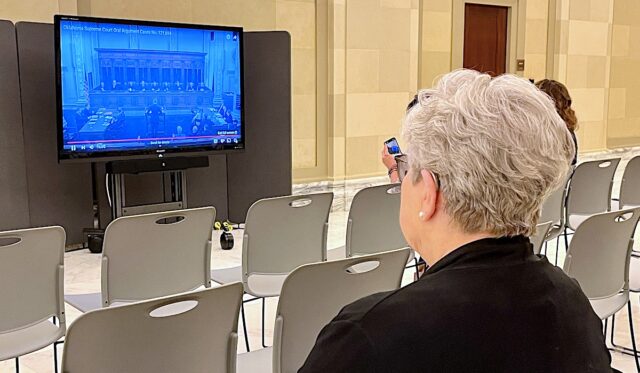
(Update: Hours after the publication of this article, the House Rules Committee revised its meeting time and agenda and advanced on a 6-3 vote a committee substitute for Senate Joint Resolution 34, adding advice and consent of the House to the proposed approval process for judicial appointments. The following article remains in its original form.)
From judicial appointments to judicial reform, judges have been a hot topic the past few months in Oklahoma.
While Gov. Kevin Stitt appointed three judges this year from the recommendations presented by the Judicial Nominating Commission, the Oklahoma Senate has sent the House a resolution that would ask voters to scrap the JNC and create a straight gubernatorial appointment system with Senate confirmation.
As that bill works its way through the Legislature, the Oklahoma Ethics Commission has settled a lawsuit with former Oklahoma County District Judge Kendra Coleman, who was removed from office by the Oklahoma Court on the Judiciary in September 2020. Both the JNC and the Court on the Judiciary are products of court reform spurred by the 1965 Oklahoma Supreme Court scandal revealed that multiple justices had accepted bribes to decide cases.
Employing a little-known state constitutional provision, Chief Justice M. John Kane IV recently appointed James Huber as a temporary justice of the Supreme Court for a pending case on Oklahoma’s Sex Offender Registry Act after Justice James Winchester recused himself from the case. Winchester’s recusal and Huber’s appointment are unusual considering oral arguments had already occurred.
You will find summaries of those matters and more in the following legal roundup. If you have a tip on an interesting case or an important precedent, please email tristan@nondoc.com.
Stitt appoints 3 judges in 2024 as Legislature mulls reform
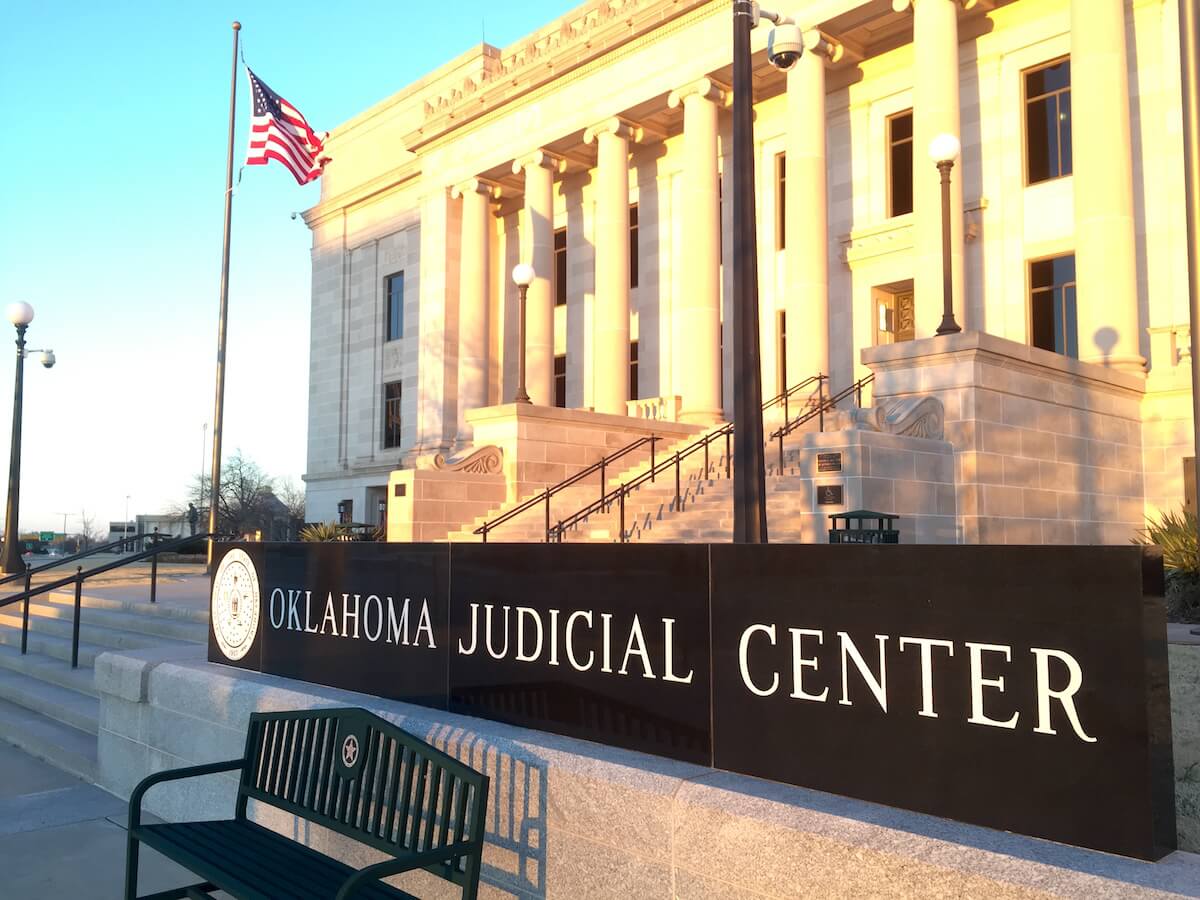
During the first quarter of 2024, Gov. Kevin Stitt appointed three new associate district judges to office in southern Oklahoma. District and associate district judges are elected in the state, but when a vacancy occurs, the governor can appoint a replacement to fill the seat.
In Pushmataha County, Nicholas Tucker officially replaced Associate Judge Jana Wallace on Feb. 26 after Wallace resigned Nov. 1. Wallace then became general counsel for the Oklahoma State Bureau of Investigation around the turn of the year.
On Feb. 16, Mark Melton was appointed to replace Murray County Associate Judge Aaron Duck. In Jackson County, Sommer Robbins was appointed to fill a vacancy left by Associate Judge Rafe Hall on Jan. 25.
Since his election in 2019, Stitt has appointed more than 30 judges across Oklahoma’s district and appellate courts, including three members of the Oklahoma Supreme Court: M. John Kane IV, Dustin Rowe and Dana Kuehn. While the governor’s office gets to make the final decision on appointments, Oklahoma has a unique feature — at least for now — that limits the governor’s appointment power: the Judicial Nominating Commission.
Since 1967, Oklahoma’s Judicial Nominating Commission has been the biggest player in judicial appointments. The commission was formed after the 1965 Oklahoma Supreme Court scandal spurred a movement to reform Oklahoma’s court system. The scandal involved systemic bribery problems among judges and resulted in the arrest of three Oklahoma Supreme Court justices — N. S. Corn, Earl Welch and Napoleon Bonaparte Johnson — and former Oklahoma City Mayor O. A. Cargill.
Whenever a judicial vacancy opens, the 15-member Judicial Nominating Commission vets candidates to fill the vacancy and narrows the field of applicants to three nominees. The governor then picks one nominee from the list to fill the seat.
The rules of the Judicial Nominating Commission are complex, with nine seats reserved for non-lawyers. Of those nine, the governor appoints six, with no more than three coming from either political party. One member is appointed each by the speaker of the House and the Senate president pro tempore. Those eight appointed commissioners then select the ninth non-lawyer. Appointed members cannot serve consecutive terms, an element of the process that has drawn criticism from House Speaker Charles McCall (R-Atoka).
Six of the commission’s seats are reserved for lawyers elected by the Oklahoma Bar Association to six-year terms from six different districts. Only attorneys licensed to practice law in the state of Oklahoma are allowed to vote in these elections.
But a proposal moving through the Legislature could eliminate the Judicial Nominating Commission and allow the governor to nominate any qualified candidate while giving the Senate the power to confirm or deny those candidates. Senate Joint Resolution 34, if successful, would put the question of whether to eliminate the Judicial Nominating Commission before Oklahoma voters. Bills to reform the JNC have been proposed before, but they have failed to win legislative approval in the past.
While the current proposal has made it through the Oklahoma Senate, it still requires approval from the House before the question can be put on ballots. SJR 34’s fate in the House this session is not clear.
“I think the House will consider that,” McCall said March 18. “I think Tennessee has a workable model. (…) Tennessee’s model is the governor nominates, but the Legislature — both the House and the Senate — decide whether to confirm that nominee.”
SJR 34 has been assigned to the House Rules Committee, which is set to hold its final meeting at 1:30 p.m. Wednesday before this week’s deadline. While the bill was not on Wednesday’s agenda at the time this article published, no proposal is “dead” until final adjournment of regular session in May.
If SJR 34 ends up being considered by the House, McCall said his preference differs from the proposal’s current form, which only requires advice and consent of the Senate for the appointment of a new judge.
“If we’re going to change the system, which includes the House currently in the JNC process, the House will need to remain in the future in that procedural change,” McCall said.
Supreme Court sides with Legislature on compact bills
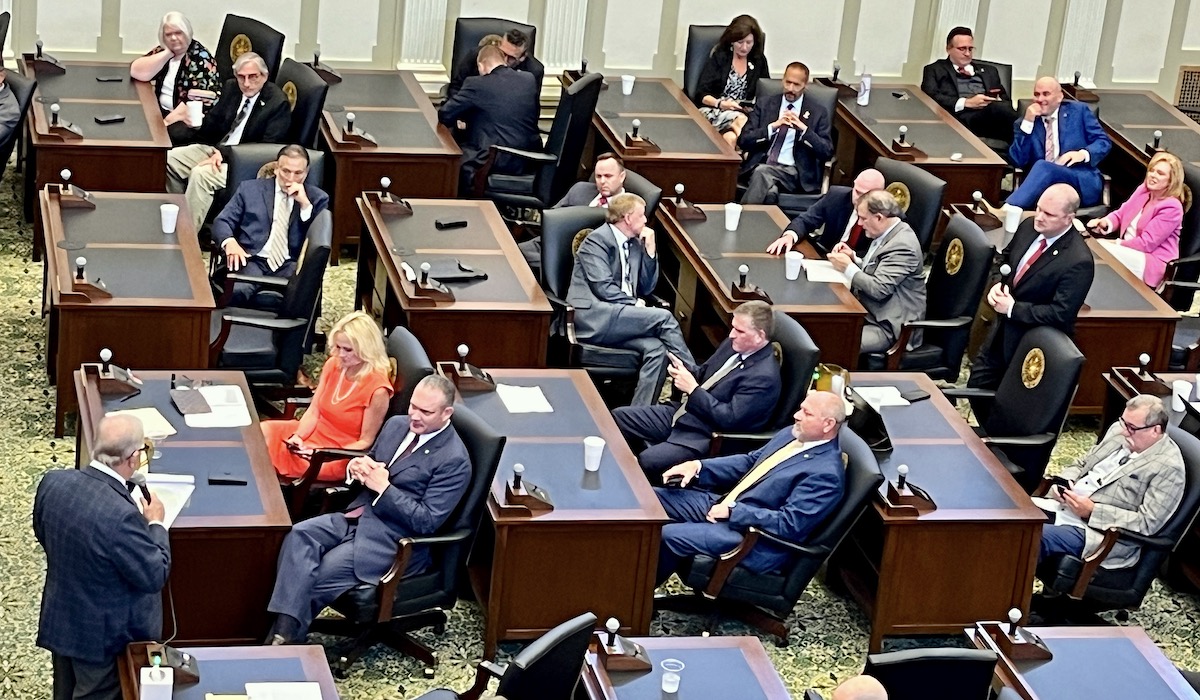
The Oklahoma Supreme Court in a 9-0 ruling April 2 rejected Stitt’s petition that a pair of bills extending tribal gaming compacts passed, vetoed and overridden into law during a 2023 special session were invalid.
Senate President Pro Tempore Greg Treat (R-OKC) praised the court’s decision and criticized Stitt’s lawsuit in a release.
“This is money that could have been spent on essential services for Oklahomans,” Treat said. “Instead, it will go toward legal fees for outside counsel in a failed attempt on flawed logic and the governor’s authority to make policy decisions. I applaud the unanimous decision by the state Supreme Court and hope we can now re-shift our focus and attention to the important work of helping Oklahomans, which include our tribal partners.”
The Legislature last summer extended expiring tobacco and motor vehicle compacts for one year. Stitt vetoed the bills, but lawmakers voted to override the governor. Stitt filed a lawsuit asking the Supreme Court to declare Senate Bill 26X and House Bill 1005X “void” and rule that the governor’s office is vested with statutory and constitutional authority to negotiate state-tribal compacts. The court unanimously rejected Stitt’s request.
Attorney General Gentner Drummond represented Treat and House Speaker Charles McCall (R-Atoka) in the lawsuit.
“Gov. Stitt has repeatedly abused his office to wage baseless legal battles against our Native American tribes, wasting millions of dollars in state resources,” Drummond said in a statement. “This ruling makes clear that the governor’s compacting authority is statutory only, subject to intervention by the Legislature when the governor fails or refuses to act in the best interest of all four million Oklahomans.”
In January, Stitt agreed with the Chickasaw Nation on new versions of both compacts. A slew of other tribes (the Choctaw, Cherokee, Wichita, Citizen Potawatomie, Wyandotte and Caddo) have followed with tobacco compacts, and on Monday a new motor vehicle compact with the Choctaw Nation was announced.
Cherokee Nation Principal Chief Chuck Hoskin Jr. applauded the Supreme Court’s ruing.
“In 2023, the Oklahoma Legislature clearly exercised its authority by extending vital tribal-state compacts through the proper legislative process,” he said in a statement. “These compacts have proven mutually beneficial, supporting key services and bolstering cooperation between the state and tribal nations like the Cherokee Nation.”
Stitt issued a statement last week saying the Supreme Court ruling will give clarity to future governors about compact negotiations.
“Over the last few weeks, I’ve finalized 11 compacts with tribal governments that protected the interests of the state, and I’m proud of that success,” Stitt said. “We are in talks right now with Cherokee officials to broker a car tag compact, and before this ruling we were confident we would get that done.”
The state’s motor vehicle compact with the Cherokee Nation still faces a pending end-of-the-year deadline, and its current terms are different than the state’s version with the Chickasaw Nation and Choctaw Nation.
“Right now, individuals driving with Cherokee car tags owe the Oklahoma Turnpike Authority over $4 million in missed tolls, so it is essential that we have a valid car tag compact to ensure that we have a Top Ten infrastructure for years to come,” Stitt said. “Now that we know that tribal governments can go to the governor or the Legislature to negotiate compacts, I hope the Legislature agrees with me that we need to collect from every tag that drives on our toll roads.”
Federal judge to OK Supreme Court: Settle Drummond, Stitt question
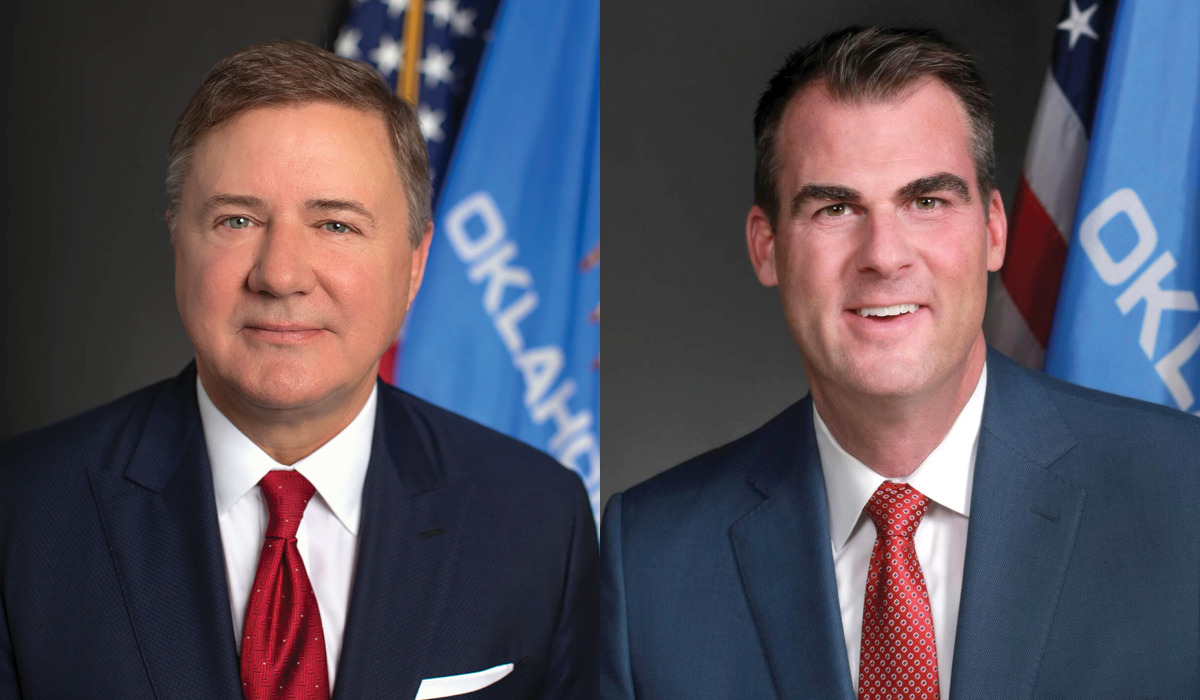
Speaking of Stitt’s legal disagreements with Drummond and tribal nations, a U.S. District Court for the District of Columbia judge ordered the Oklahoma Supreme Court to answer a decision about state government before a pending federal lawsuit over tribal gaming compact authorization can move forward.
The March 21 opinion and order asks the state’s highest court to rule whether Drummond had legal authority to intervene and control Oklahoma’s defense of a lawsuit filed by larger tribal nations against Stitt and the U.S. Department of the Interior, which deemed Stitt’s compacts with smaller tribal nations to be approved in 2020.
As stated by U.S. District Judge Timothy Kelly in his order, the Oklahoma Supreme Court is asked:
May the attorney general of Oklahoma, under Title 74, Section 18 of the Oklahoma statutes, “take and assume control” of the “defense of the state’s interests,” Okla. Stat. Title 74 §18b(A)(3), in the instant case before this court — in which the governor of Oklahoma is named as a defendant in his official capacity for his role in entering into certain tribal-gaming contracts on behalf of the state of Oklahoma — over the objection of the governor, who is vested with “supreme executive power” under Article VI, Section 2 of the Oklahoma Constitution, and when the governor has already exercised his authority under Title 74, Section 6 of the Oklahoma statutes to “employ counsel to protect the rights or interests of the state,” Okla. Stat. Title 74 § 6?
Underscoring the litigious nature of the entire case, the final seven pages of the 21-page opinion and order constitute notification of the plethora of attorneys representing the numerous parties.
Indictments mount from black market marijuana investigations

A multi-county grand jury indicted six people March 7 following two seizures of illegally grown marijuana near Prague, the latest in a series of marijuana related indictments sought and achieved by the Office of the Attorney General’s Organized Crime Task Force and partner agencies, including the Oklahoma Medical Marijuana Authority.
“The menace of illegal marijuana grows run by foreign nationals is a dire threat to public safety in Oklahoma,” Attorney General Gentler Drummond said in a statement.”
In the first seizure case, Paul Wayne Baxter, 67; Beng Di Chan, 46; Min Yong Chen, 56; Zeng Chen Lau, 54; and Chen Fu Lin, 36, were indicted for conspiracy to defraud the state. During a sweep in Pottawatomie County, law enforcement officers discovered 77,000 marijuana plants and 2,000 pounds of harvested marijuana, along with firearms.
Baxter faces five counts of aggravated manufacturing of a controlled dangerous substance (marijuana), while Beng, Min, Zeng and Chen face one count apiece. Min is charged with possession of an offensive weapon while in commission of a felony, while he and Baxter face one count each of possession of proceeds from illegal activity. All five are accused of submitting false information to the OMMA about the true ownership of Cannabaxter Farms. All the charges are felonies.
In the second seizure, Kangbin Lee, 29, was indicted on felony counts stemming from a Jan. 11 raid at Monster Farms in Muskogee that yielded about 1,000 pounds of marijuana. He faces one count each of aggravated trafficking of a controlled dangerous substance in excess of 1,000 pounds of marijuana, manufacturing a controlled dangerous substance (marijuana), trafficking of a controlled dangerous substance in excess of 25 pounds of marijuana, possession of an offensive weapon while in the commission of a felony and possession of proceeds from unlawful activity,
The indictments in those two seizures followed another earlier this year. On Feb. 29, a multi-county grand jury indicted Bobby Lee Hailey, 41, on one count of manufacturing a controlled substance and one count of aggravated trafficking of a controlled and dangerous substance after a November seizure of more than 72,000 pounds of marijuana. Police said the drugs were destined for the black market.
After Oklahomans overwhelmingly voted to create a medical marijuana program in 2018, lawmakers have slowly funded more agents and efforts to combat a burgeoning black market, which has seen deadly connections to organized crime. Concerns over land and resource usage have also been commonly cited by law enforcement agencies, rural landowners and legislators.
James Huber elevated on pending Supreme Court case
On March 15, Oklahoma Supreme Court Chief Justice M. John Kane IV appointed James Huber, a judge on the Oklahoma Court of Civil Appeals, to serve as a temporary justice on the Supreme Court in a pending case after Justice James Winchester recused himself. Winchester recused from Donaldson v. City of El Reno on Feb. 1, two months after oral arguments — viewable online — were held.
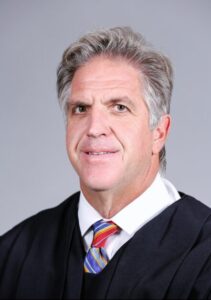
The Oklahoma Constitution gives the chief justice the power to make temporary appointments to the court when there is a vacancy. The ability allows the court to avoid the potential for 4-4 split decisions, but it also gives the chief justice a lot of power in choosing a potential tie-breaker.
The Donaldson case, involving the retroactive application of Oklahoma’s Sex Offender Registry Act, will decide whether sex offenders in the state are governed by the current version of the act or if they are only regulated by the requirements of the act at the time of their conviction or plea.
Currently, Oklahoma law applies the version of the act at the time of a registered sex offender’s conviction or plea, resulting in a complicated regulatory scheme. (The City of El Reno argues the rule is actually narrower and only applies to the retroactive assignment of offender levels by the Department of Corrections). While a sex offender convicted today would have to follow all the requirements in statutes, an offender convicted in 2005 would only have to follow the registration requirements that existed in 2005. As a result, law enforcement must know and enforce multiple versions of the SORA.
The City of El Reno, Attorney General Gentner Drummond’s office and the Oklahoma Municipal League are asking the court to overturn their 2013 decision in Starkey v. Oklahoma Department of Corrections, which barred the retroactive application of SORA. If their efforts are successful, the current version of SORA would be applied to all sex offenders in the state, regardless of their conviction date.
Starkey was decided 7-2 back in 2013, but three justices from the Starkey majority are no longer on the court. With the Starkey majority weakened, the court could be willing to overturn its previous decision. Notably, Winchester dissented in Starkey.
Follow @NonDocMedia on:
Facebook | X | Text or Email
Ethics Commission, ousted judge agree to settle 4-year-old case

The Oklahoma Ethics Commission has reached a settlement agreement with ousted Oklahoma County District Judge Kendra Coleman who was accused of violating campaign rules during her 2018 election to office. Coleman was removed from office in 2020 on misconduct grounds, with the Oklahoma Court on the Judiciary ruling that she committed oppression in office, violated the Code of Judicial Conduct multiple times and violated Ethics Commission reporting rules involving her campaign.
Now, the Ethics Commission’s settlement involves the commission dismissing its civil lawsuit against Coleman and both sides agreeing to seek no further litigation in the matter. Each side will pay their own fees and costs.
A unanimous joint application for settlement and dismissal was filed March 12 in Oklahoma County District Court. District Judge C. Brent Dishman later that day issued an order dismissing the case.
All present and former defendants were dismissed with prejudice, which means the same court action can’t be filed again, and the Ethics Commission was released from any claim being filed against it arising from the filing of the case, according to Dishman’s order.
Members of the Ethics Commission voted 4-0 to make the settlement offer to Coleman after meeting in executive session during their March 8 meeting. The Ethics Commission in 2021 filed a civil lawsuit in Oklahoma County District Court against Coleman accusing her of multiple campaign violations and seeking tens of thousands of dollars on behalf of the state.
Coleman was elected in 2018 in her first bid for office. The Ethics Commission claimed she accepted prohibited donations, made unlawful expenditures, failed to keep required records and filed late and inaccurate reports.
Coleman reported raising $29,020 in cash from donors to her 2018 campaign. The Ethics Commission alleged she misspent more than $10,000 of the funds, including for spa services and makeup.
The Ethics Commission opened a formal investigation in September 2019, and a month later the agency issued a subpoena for records. In December 2019, Coleman’s attorneys asked the Oklahoma Supreme Court to take jurisdiction of the matter, which justices denied a month later. Defending the failed application cost the Ethics Commission about $21,000, according to its lawsuit.
In its lawsuit, the Ethics Commission had sought to have Coleman pay civil penalties to the state’s General Revenue Fund, plus up to three times the value of “all unlawful contributions to and expenditures from (her campaign) committee.” The Ethics Commission also sought reimbursement for its legal expenses and the cost of its investigation.
In its lawsuit, filed by former Oklahoma Attorney General Drew Edmondson, the Ethics Commission alleged that Coleman filed multiple reports on behalf of her campaign committee that included “inaccurate and misleading information.” Commissioners, the lawsuit said, attempted to work with Coleman “to correct the reports on multiple occasions, but such efforts proved unsuccessful.”
When Coleman was removed from office, the Court on the Judiciary did not disqualify her from holding judicial office in the future. However, when she attempted to file in 2022 for her old judicial post, she was told that according to state law “no one who has been removed from judicial office (…) shall qualify to file as a candidate for judicial office.”
Controversial attorney Ron Durbin suspended by Supreme Court
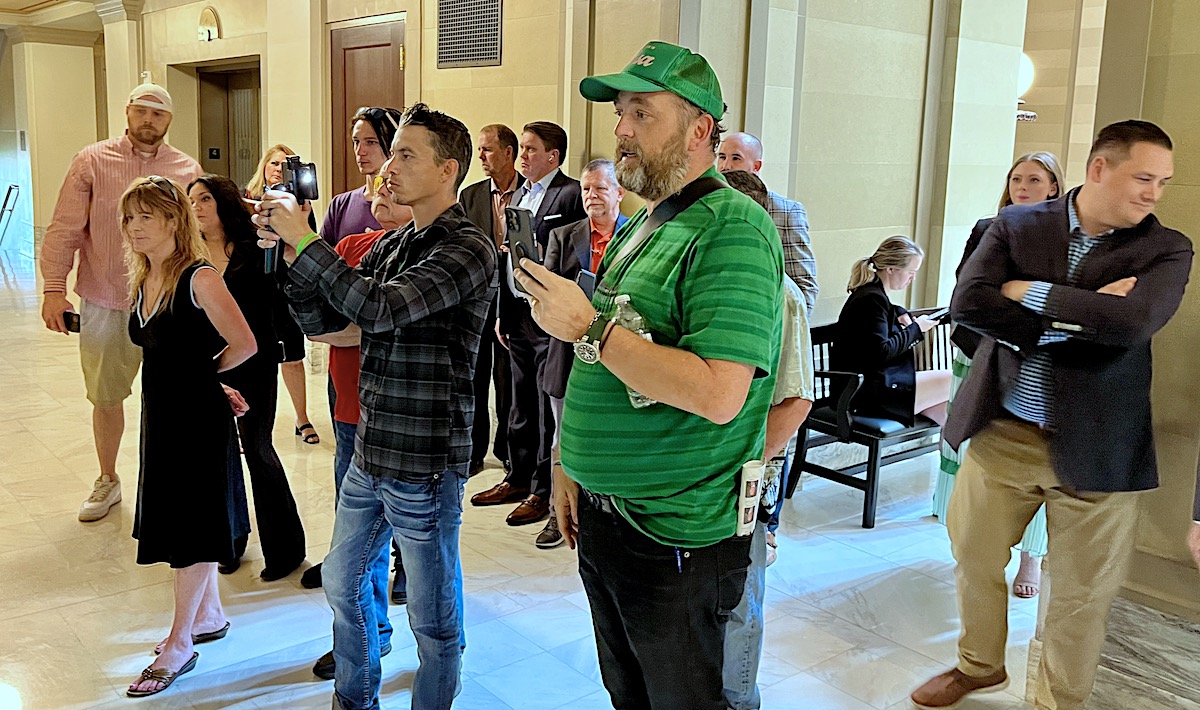
On Monday, the Oklahoma Supreme Court issued a unanimous order suspending controversial Tulsa attorney Ron Durbin from the practice of law. The Oklahoma Bar Association filed its 69-page complaint detailing several grievances in July, citing numerous antics and actions by Durbin as justification for suspending his license.
“Complainant submits respondent continues to assert reckless, malicious and dishonest statements in his ‘Facebook Live’ broadcast sessions that are posted online and publicly accessible,” Justice Dustin Rowe wrote in the order. “According to the OBA grievances, during these broadcasts the respondent disparages judges, the judiciary, opposing counsel, the OBA and anyone with opposing views.”
Durbin has represented several clients in Oklahoma’s medical marijuana industry, and his aggressive approach has irritated others in the industry who believe he distracts from legitimate concerns, such as how the Oklahoma Medical Marijuana Authority has conducted and adjudicated emergency shutdown actions.
“Respondent’s false and incendiary attacks on the legal system and judiciary are continuing as evidenced by complainant’s amended complaint filed on March 6, 2024, wherein complainant brought new charges against respondent for similar and inappropriate behavior of the Oklahoma Rules of Professional Conduct,” Rowe wrote. “The court ordered respondent to show cause no later than March 1, 2024, why an emergency interim suspension should not be entered. The court sent a file-stamped copy of the order and verified amended complaint to respondent’s official roster address. Respondent filed an objection on March 4, 2024, wherein respondent denies all of the allegations alleged. Respondent argues, among other things, that the OBA General Counsel’s Office is corrupt or intent, and/or that the OBA cannot support the allegations against him.”
On Monday, Durbin made a Facebook post criticizing the Supreme Court for its decision.
“No trial. No hearing! No justice! Won’t let me move to dismiss any of their claims, but treats them all as true for them. Yeah, the system is flawed, and that’s the Oklahoma Supreme Court way!” Durbin said. “When I decided to fight the corruption four years ago, I knew I was risking it all. Fight is far from over, and now I go to federal court. Oh well, don’t forget HEARINGS ON WEDNESDAY on [medical marijuana] bills in the House Committee.”
Still need more? Other Oklahoma court tidbits to note
There are always new legal issues bubbling up in Oklahoma. Some of the top issues worth watching are:
- Osage Wind LLC is looking to negotiate with the Osage Nation in order to retain 84 wind turbines owned by the company, after Judge Jennifer Choe-Groves ordered the turbines’ removal last December for infringing on the tribe’s mineral estate. However, the Osage Nation has maintained in court filings that the turbines must be removed.
- The Choctaw Nation of Oklahoma swore in Appellate Judge Fob Jones on Feb. 2 to the three-judge Choctaw Nation Appellate Court. He replaced Judge Bob Rabon who died March 5 after a decades-long career serving the Choctaw Nation. He served for 47 years as the Choctaw Nation’s general counsel before serving most recently as appellate judge.
- The Cherokee Nation swore in Janice Purcell as the nation’s fourth district judge. Purcell is an attorney and former adjunct professor at Northeastern State University in Tahlequah. The term expires in February 2028.
- Oklahoma’s medical districts are not government entities, but they “are subject to liability to the same extent as municipalities and counties within the state enjoy such immunity,” according to a decision from Oklahoma Supreme Court. Medical districts are unique creatures of state law (authorized by a 1976 referendum) that can be set up by county governments to run ambulance services. (This legislative session, Senate Bill 1653 has advanced from the Senate to the House regarding the topic.)
- On Feb. 9, the 10th Circuit reversed a decision from the U.S. Western District of Oklahoma dismissing a lawsuit brought by anonymous students against Oklahoma State University. The lawsuit seeks to challenge university policies, such as the code of conduct and harassment policy, that attempt to regulate student speech.
- The Oklahoma Supreme Court reversed a lower court’s dismissal of a wrongful death and excessive force claim filed against the Oklahoma County Sheriff’s Office for the 2013 death of Emmett Martin in the Oklahoma County Jail.
- District Attorney Jason Hicks released some of his text messages after a lawsuit was filed by Reps. Justin Humphrey (R-Lane) and Kevin McDugle (R-Broken Arrow) alleging he violated the Oklahoma Open Records Act when he refused a request to release messages related to death-row inmate Richard Glossip and hearings before the Pardon and Parole Board. A request by Hicks to dismiss the suit was rejected by Judge Brent Russell on March 13, a few days before Hicks released the messages.
Legal cases take time to move through the court system. Here are some recent developments in cases NonDoc has previously covered:
- Shawn McKibbin, the former Chelsea chief of police charged with two financial crimes Dec. 22, had his case continued to April 29 in a hearing March 18.
- According to court records, Billy Zane Deo and Deangelo Reyes remain at-large with active warrants.
- Gannett is appealing a $25 million dollar jury award to Scott Sapulpa. A jury in Muskogee County awarded Sapulpa the significant figure after The Oklahoman wrongly identified him as the speaker of a racial slur at a high school basketball game in 2021. In Gannett’s appeal, the company argues that teachers are public figures, for whom the standard of libel is higher.
- Brayden Bull‘s three criminal cases continue to move slowly. Newly appointed Judge John Russell took over Bull’s federal case, for which he is awaiting sentencing. While Bull remains in federal custody, his next Cherokee Nation hearing is scheduled for June 13.
- Muscogee Nation v. City of Tulsa, a federal lawsuit over the city’s application of criminal jurisdiction to tribal citizens in municipal court, was reassigned from Judge Claire Eagan to Judge John Russell in February.
- In the Eastern District of Oklahoma, Matthew Douglas’ suit seeking a declaration that the Muscogee Nation lacks criminal jurisdiction over him has been assigned to Magistrate Judge D. Edward Snow. Douglas’ lawsuit was filed by Oklahoma Attorney General Gentner Drummond.




















